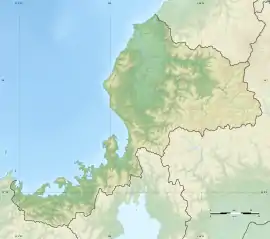| Myōtsū-ji | |
|---|---|
明通寺 | |
 | |
| Religion | |
| Affiliation | Buddhist |
| Deity | Yakushi Nyorai |
| Rite | Shingon |
| Status | functional |
| Location | |
| Location | 5-22 Monzen, Obama-shi, Fukui-ken |
| Country | Japan |
 Shown within Fukui Prefecture  Myōtsū-ji (Japan) | |
| Geographic coordinates | 35°27′13″N 135°48′16″E / 35.45361°N 135.80444°E |
| Architecture | |
| Founder | Sakanoue no Tamuramaro |
| Completed | 806 |
| Website | |
| Official website | |

Myōtsū-ji (明通寺) is a Shingon-sect Buddhist temple in the city of Obama, Fukui Prefecture, Japan.
History
The foundation of Myōtsū-ji is uncertain. Per temple records dated 1374, the temple was founded by the famous general Sakanoue no Tamuramaro in 806. Two of the structures of the temple date to the Kamakura period: the Hondō and the three-storey pagoda and both are designated National Treasures. A number of Heian-period statues within these buildings are designated Important Cultural Properties. The temple also has a garden with a pond.[1]
Buildings
- Hondō (1258) (NT),[2][3] also referred to as the Yakushi-dō (薬師堂) has a floor plan of 14.09 m × 14.82 m. The building has a hipped roof with a distinctive roof beam and is covered with cypress bark shingles (檜 皮 葺, Hiwada-buki). It was restored in 1923.
- Three-storey pagoda (1270) (NT),[4][5] with a total height of 22.13 meters is also covered with cypress bark shingles. It was restored in 1958.
- Sanmon (1772) is an Obama City Cultural Property (C.ICP), and contains statues of the Kongōrikishi which are dated 1264, and which are also Obama C.ICPs.
- Shōrō
Treasures
- Seated wooden statue of Yakushi Nyorai (Heian period) (Important Cultural Property), Gohonzon[6]
- Standing wooden statue of Gōzanze Myōō (Heian period) (ICP)[7]
- Standing wooden statue of Fudō Myōō (Heian period) (ICP)[8]
- Standing wooden statue of Jinja Daishō (Heian period) (ICP)[9]
- Kenponchakushoku Hikohohodemi-no-mikoto emaki, 6 scrolls (Edo period) (Prefectural Cultural Property)[10]
- 399 donor plaques dating from 1309 to 1694 (Prefectural Cultural Property)[11]
See also
References
- ↑ "Myōtsūji". Obama City. Retrieved 31 January 2012.
- ↑ "Myōtsūji - Hondō". Agency for Cultural Affairs. Retrieved 31 January 2012.
- ↑ "Myōtsūji - Hondō". Fukui Prefecture. Retrieved 31 January 2012.
- ↑ "Myōtsūji - Sanjūnotō". Agency for Cultural Affairs. Retrieved 31 January 2012.
- ↑ "Myōtsūji - Sanjūnotō". Fukui Prefecture. Retrieved 31 January 2012.
- ↑ "Myōtsūji - Yakushi Nyorai". Fukui Prefecture. Retrieved 31 January 2012.
- ↑ "Myōtsūji - Gōzanze Myōō". Fukui Prefecture. Retrieved 31 January 2012.
- ↑ "Myōtsūji - Fudō Myōō". Fukui Prefecture. Retrieved 31 January 2012.
- ↑ "Myōtsūji - Jinja Daishō". Fukui Prefecture. Retrieved 31 January 2012.
- ↑ "Myōtsūji - Kenponchakushoku Hikohohodemi-no-mikoto emaki". Fukui Prefecture. Retrieved 31 January 2012.
- ↑ "Myōtsūji - Nyohōkyō ryōsoku kishin fuda". Fukui Prefecture. Retrieved 31 January 2012.
External links
Wikimedia Commons has media related to Myōtsūji.
- (in Japanese) Official website
This article is issued from Wikipedia. The text is licensed under Creative Commons - Attribution - Sharealike. Additional terms may apply for the media files.